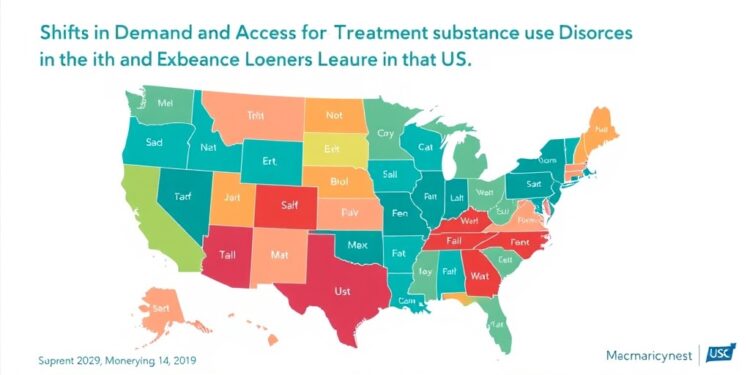The COVID-19 pandemic has significantly impacted public health, leading to an alarming surge in substance use disorders. Recent studies indicate that the prevalence of these disorders has grown, particularly during the pandemic’s most intense phases. The stress, anxiety, and isolation brought on by lockdowns and social distancing measures have contributed to this troubling trend. Various demographics have reported increased usage of alcohol and drugs, highlighting a broader public health crisis that extends beyond mere statistics.
As healthcare systems worldwide grappled with the immediate effects of the pandemic, treatment access for individuals suffering from substance use disorders faced unprecedented challenges. Initially, treatment services saw a decline, as many facilities were forced to close their doors or limit operations. The surge in COVID-19 cases strained healthcare resources, resulting in fewer outlets for those seeking help with addiction. This decline in access to care has raised concerns about the long-term implications for those already grappling with substance abuse issues.
Despite the initial disruptions, the landscape began to shift around 2022 as healthcare systems adapted to the ongoing pandemic. Many treatment programs reopened, and the rapid adoption of telehealth services allowed patients to access care remotely. This shift not only improved treatment rates but also revealed a new avenue for engagement in addiction treatment. The integration of technology into healthcare has transformed the way individuals seek and receive support, ensuring they are not left without necessary resources during a time of crisis.
Telehealth emerged as a critical resource for many patients who found it challenging to attend in-person appointments due to health concerns or mobility issues. Virtual consultations offered a lifeline that expanded access to treatment options that were previously unavailable to those in rural or underserved areas. This embrace of telehealth has created pathways for continuous engagement with healthcare providers, keeping patients connected to vital support networks during tumultuous times.
The changing attitudes towards addiction treatment and mental health fueled a rise in public awareness campaigns and advocacy efforts. Many organizations have emphasized the importance of viewing substance use disorders not merely as personal failures but as complex health issues requiring comprehensive support and understanding. This narrative shift has encouraged individuals to seek help and has reduced the stigma that often accompanies seeking treatment for addiction.
Additionally, various community-based organizations and intervention programs have played essential roles in bridging the gap in addiction services. By providing resources directly to communities, these initiatives have offered localized support and information, allowing individuals to make informed decisions about their health. This grassroots approach to addressing substance use disorders has underscored the need for tailored support systems that recognize specific community needs.
The public health crisis surrounding substance use disorders emphasizes the importance of prioritizing mental health and substance abuse support in health policy discussions. Policymakers and healthcare leaders must remain vigilant in addressing the needs of individuals affected by addiction, particularly in a recovering society. As we navigate the post-pandemic landscape, it will be crucial to ensure that effective treatment options remain accessible and that public awareness initiatives continue to destigmatize seeking help.
As the healthcare system evolves, integrating preventative measures will also be critical in reducing the incidence of substance abuse. Education campaigns aimed at informing vulnerable populations about the risks associated with substance use may play a vital role in preventing future crises. Strengthening community resources and support systems will create an informed public, equipped to handle the challenges that may arise.
In conclusion, the COVID-19 pandemic has revealed significant vulnerabilities within the healthcare system concerning substance use disorder treatment. However, it has also fostered innovation, resilience, and a renewed focus on mental health and addiction treatment approaches. As we look ahead, stakeholders must strive to maintain the momentum generated by these challenges and ensure that comprehensive, compassionate care remains at the forefront of public health initiatives, addressing the complexities of addiction and recovery.
By considering the lessons learned from this crisis, the hope is to build a more robust healthcare infrastructure that can effectively support individuals grappling with substance use disorders, ultimately contributing to healthier communities and a more resilient society.
Subject of Research: Substance Use Disorder Trends During COVID-19 Pandemic
Article Title: The Impact of COVID-19 on Substance Use Disorder Treatment and Recovery
News Publication Date: October 2023
Web References: [Link to Study]
References: doi:10.1001/jamanetworkopen.2024.53317
Image Credits: [Not Provided]
Keywords: Substance Abuse, COVID-19, Public Health, Telehealth, Addiction Treatment, Mental Health, Healthcare System, Community Support, Policy, Recovery, Telemedicine, Behavioral Psychology





